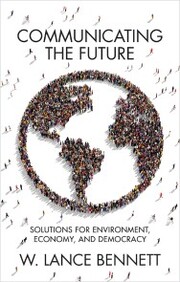Detailansicht
Communicating the Future
E-Book
Format: EPUB
DRM: Adobe DRM
- Zusatztext
-
We are facing an unprecedented environmental crisis. How can we communicate and act more effectively to make the political and economic changes required to survive and even thrive within the life-support capacities of our planet?
This is the question at the heart of W. Lance Bennetts much-anticipated book. Bennett challenges readers to consider how best to approach the environmental crisis by changing how we think about the relationships between environment, economy, and democracy. He introduces a framework that citizens, practitioners, and scholars can use to evaluate common but unproductive communication that blocks thinking about change; develop more effective ways to define and approach problems; and design communication processes to engage diverse publics and organizations in developing understandings, goals, and political strategies. Until advocates develop economic programs with built-in environmental solutions, they will continue to lose policy fights. Putting intersectional communication into action requires acknowledging that communication is not only an exchange of messages, but an organizational process.
Communicating the Future is important reading for students and scholars of media and communication, as well as general readers concerned about the environmental crisis.
-
- Kurztext
- We are facing an unprecedented environmental crisis. How can we communicate and act more effectively to make the political and economic changes required to survive and even thrive within the life-support capacities of our planet? This is the question at the heart of W. Lance Bennett’s much-anticipated book. Bennett challenges readers to consider how best to approach the environmental crisis by changing how we think about the relationships between environment, economy, and democracy. He introduces a framework that citizens, practitioners, and scholars can use to evaluate common but unproductive communication that blocks thinking about change; develop more effective ways to define and approach problems; and design communication processes to engage diverse publics and organizations in developing understandings, goals, and political strategies. Until advocates develop economic programs with built-in environmental solutions, they will continue to lose policy fights. Putting “intersectional” communication into action requires acknowledging that communication is not only an exchange of messages, but an organizational process. Communicating the Future is important reading for students and scholars of media and communication, as well as general readers concerned about the environmental crisis.
- Autorenportrait
- W. Lance Bennett is Emeritus Professor of Political Science and Communication, and Senior Research Fellow at the Center for Journalism, Media and Democracy at the University of Washington.
